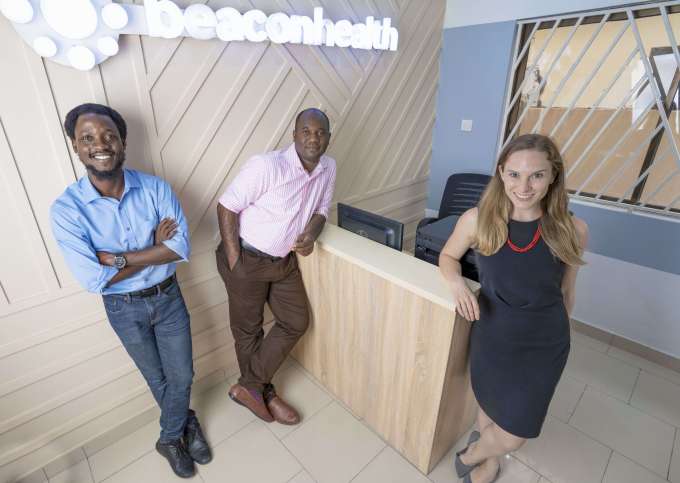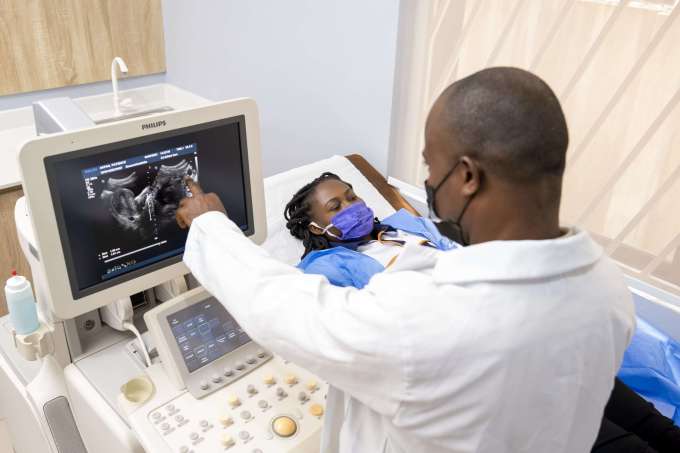It is no secret that healthcare in Nigeria and most parts of Africa is not easily available and a lot of work needs to be done in that regard. However, there are instances where accessibility is taken for granted. Take for instance Nigeria where a majority of the population with some form of healthcare access would rather treat diseases than prevent them in the first place.
As a result, people get to find out about life-threatening diseases, especially non-communicable ones (NCDs), much later in their lives. Access to diagnostics and preventive care is key to addressing this situation, and Nigerian-based diagnostic startup MDaaS Global is keen on making these services readily accessible. Today, the startup also announcing the launch of its product SentinelX, has closed a seed extension round of $2.3 million to scale across Nigeria.
MDaaS, an abbreviation for medical devices-as-a-service, started back in 2016. It operates a network of tech-enabled diagnostic centers across Nigeria. Two years ago, it raised a million-dollar seed round. And in addition to the other investments secured over the last five years, the healthtech startup has raised a total of $3.7 million.
The investors in the round include lead Newtown Partners, who invested via its Imperial Venture Fund, CRI Foundation, and return investors FINCA Ventures, Techstars, and Future Africa.
The idea for MDaaS came when co-founder and CEO Oluwasoga Oni was tasked alongside his classmates at an MIT class to develop an idea that could impact a billion lives. Coming from a medical background, he chose the one he could relate to.
“I wanted to solve the problem close to me and my dad in my early years. He had a 30-bed hospital and struggled so hard to find medical equipment that was good for him and also at a good rate,” he said to TechCrunch.
Oni started MDaaS with Opeyemi Ologun, Genevieve Barnard Oni, and Joseph McCord. With their connections in the U.S., the founders began connecting secondary medical equipment marketplace in the U.S. to Nigeria. They would import equipment, provide service support, and deploy to hospitals via rent, lease, or outright sale.
The founders did this for a while until they realized that the core problem wasn’t providing equipment pieces; it was a matter of necessity. The money doctors spent on the pieces of equipment was more than the earnings from patients. Therefore it just didn’t make financial sense for doctors to own the equipment.
MDaaS decided to revert to an aggregation model where they would look at a clinically underserved area, build a centralized diagnostic center, and aggregate demand from small, medium-sized hospitals within that community. They launched the first center in the Nigerian southwestern city of Ibadan. The startup subsequently got into Techstars and has since added six other centers across other cities in Nigeria.
MDaaS co-founders (L-R) Oluwasoga Oni, Opeyemi Ologun and Genevieve Oni
MDaaS diagnostic centers offer a wide range of services. First, there are imaging services such as digital x-ray and ultrasound, cardiac services such as ECG and echo. Then the lab services ranging from chemistry analysis and immunoassay to hematology.
So how did SentinelX come about? Oni tells me that it was during the pandemic last year. As MDaaS helped out with testing for COVID in patients, it was also taking time to screen for underlying health conditions.
“We didn’t really find a lot of people that had COVID, but what we found was that a lot of people had underlying conditions like high blood pressure and high cholesterol that they didn’t know about. So we were really shocked about that.”
In the past two decades, NCDs have risen dramatically in sub-Saharan Africa. They are driven by a growing incidence of cardiovascular risk factors like unhealthy diets, reduced physical activity, hypertension, and diabetes. Statistics point out that by 2030, NCDs are set to become the leading cause of mortality on the continent.
So far, MDaaS has done a reasonably good job with its diagnostic centers. To date, the healthcare startup has provided diagnostic services to over 40,000 patients in underserved communities. It has also performed over 80,000 diagnostics tests across cardiology, radiology, neurology, laboratory, and general health checks. Over 750 clinicians use its referral network, and it has locked partnerships with more than 500 health facilities and 10 HMO networks.
Therefore, building SentinelX on the infrastructure already put in place serves as an opportunity to provide more customer-centric products for its users. The platform acts as a personalized care program where patients pay a one-time fee of N35k (~$70) and access a doctor all year round.
At the moment, users can run through a series of tests ranging from 60 or 70 biomarkers to assess individual risk for a wide range of diseases, including cancers, diabetes, kidney disease, and heart diseases. Clinical and family history and demographic data are also taken into consideration as part of the comprehensive analysis. Meanwhile, MDaaS creates a care plan unique to customers should they have health concerns after screening.
Image Credits: MDaaS
SentinelX is currently in private beta. However, the plan is to go live in September 2021. One would argue that $70 for a year might be cheap for this kind of service, Oni concurs but says it’s all about the long game for MDaaS.
“What we’re trying to solve is non-consumption. Most people in Nigeria don’t go for annual screening, which is something meant to be routinely done. Instead, what we tend to have in Nigeria is that people wait till they get sick before going for checkups. By that time, it costs so much money to solve the problem,” Oni echoes on the lackadaisical effort some Nigerians place on their health.
Through SentinelX, MDaaS is trying to get as many people as possible to cheaply pre-screen themselves for one year then pay for full value the next year after seeing the benefits of regular checkups. The service is one of many MDaaS can deploy on top of its diagnostic infrastructure built over the years. But getting to this point meant the startup had to scale through the capital-intensive hurdle associated with infrastructural plays. Moreover, defining what price to charge patients has even become more challenging due to the economic recession that has frequently plagued Nigeria.
“We have had to get very creative in the way we build things because we target low to middle-income patients. As a result, we’ve needed to customize our diagnostic infrastructure, especially as it relates to costs for the people we serve,” Oni added.
The economic recession has also affected one of MDaaS’ most priced assets: doctors. Brain drain is a major challenge facing the Nigerian health system right now. It has led to a dramatic reduction in the number of Nigerian doctors who leave for a better quality of life and pay, with some reports estimating that over 2,000 doctors leave annually.
“When you hear about it in the news, it seems like a theoretical thing. But for us, it is real because we have staff leaving to go abroad,” the CEO remarked. MDaaS tries to approach the situation by training younger doctors and deploying them to its centers. Still, there’s some commitment play as both parties agree on a period of time the doctor would work with the company.
Per application of funds, MDaaS wants to scale its physical footprint across Nigeria by adding six more diagnostic centers this year. According to Oni, the healthtech startup wants to become one of Nigeria’s three largest diagnostic centers. The CEO also said MDaaS would consider a pan-African expansion to similar countries like Nigeria, although he gave no timeline. But by 2025, the company aims to operate 100 centers across the continent and serve a million patients per year.
Speaking on the news, the managing partner at Newtown Partners, Llew Claasen, said, “Most consumers in sub-Saharan Africa receive suboptimal medical care because of infrastructure gaps, low physician density, delays in diagnostics, and a lack of health data visibility. We think the physical diagnostic infrastructure that MDaaS is building out, coupled with the means to collect data and deliver value-added software services, has the potential to completely change the way that physicians, clinicians, and pharmacists do their jobs and lead to better health outcomes for a huge number of previously underserved consumers.”
Rising African venture investment powers fintech, clean tech bets in 2020
